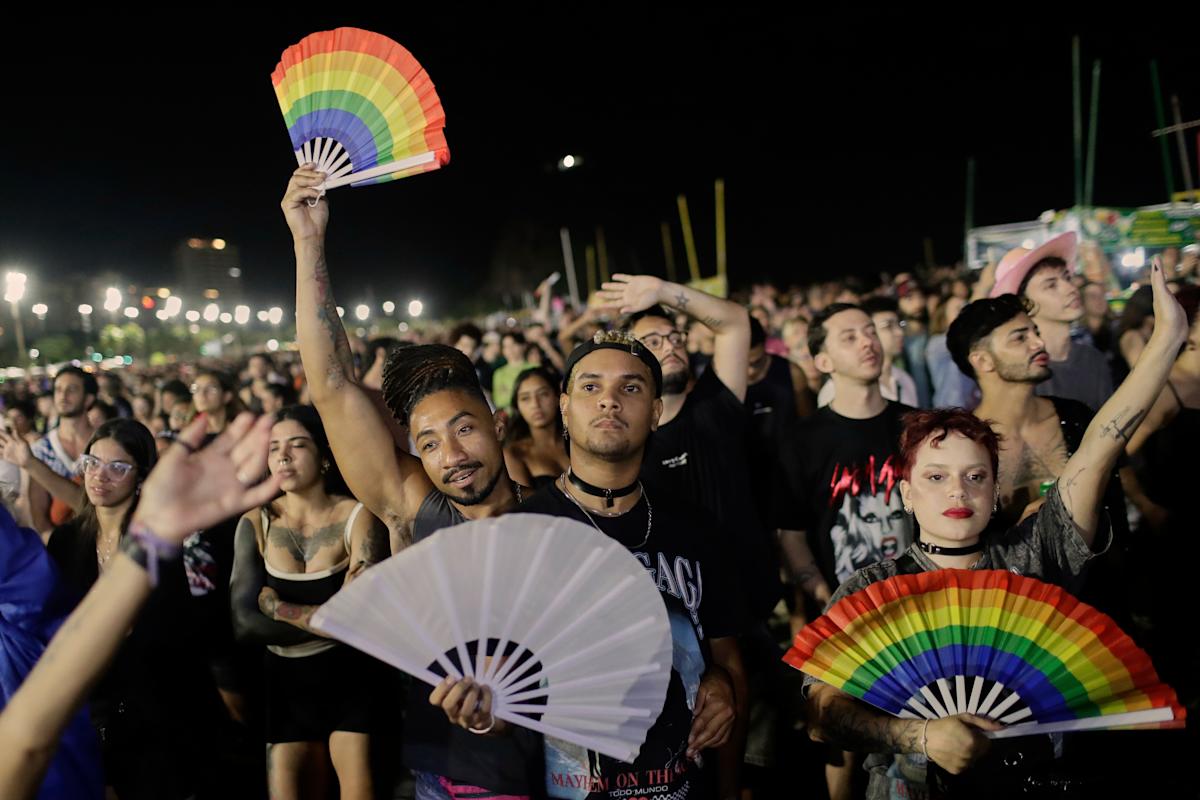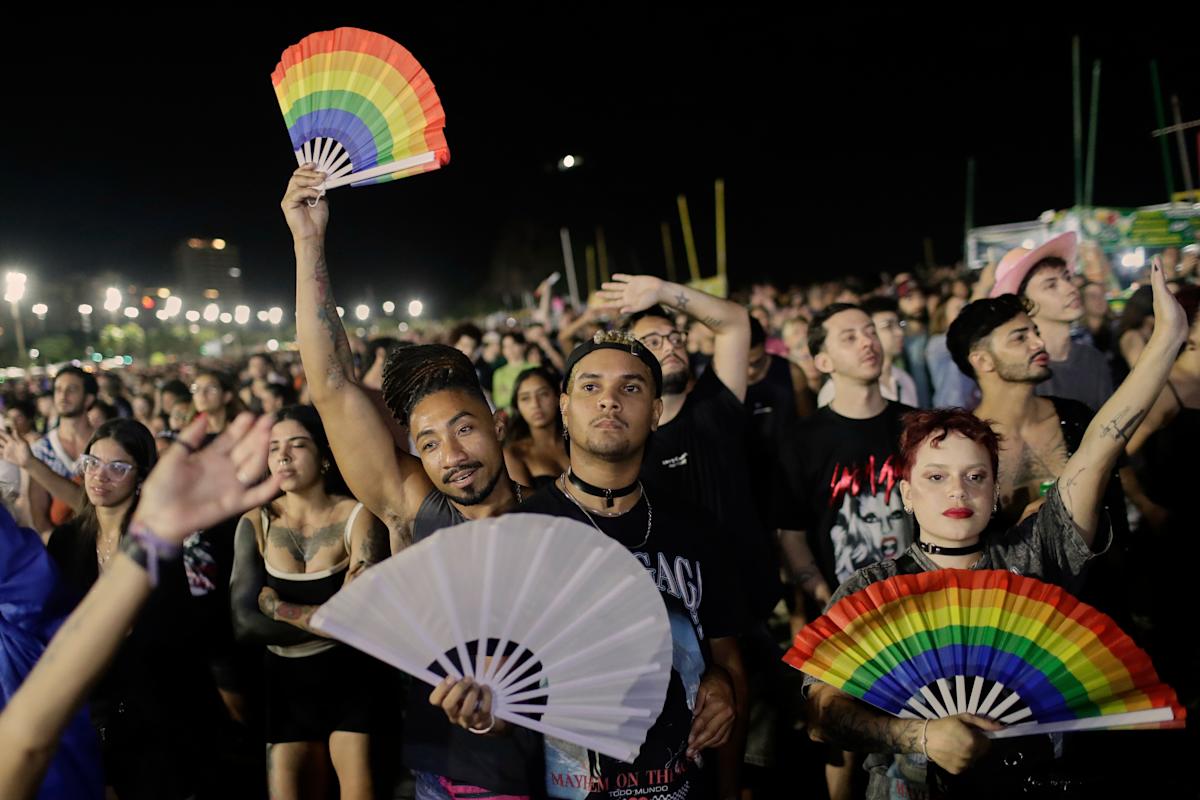Imagine the electric thrill of a sold-out Lady Gaga concert, the roar of the crowd, the pulsing lights, and a shadow of fear lurking just beneath the surface. That’s the unsettling reality painted by reports surfacing today. A man recently deported from the United States has been identified as a suspect in a chilling plot to bomb the very concert that electrifies millions. This raises alarm bells: how did this individual slip through the cracks, and what chilling implications does this have for the safety of future concerts and events?

The Alleged Plot and Arrests
The Foiled Attack

Brazilian authorities foiled a chilling plot to attack Lady Gaga’s free concert on Copacabana Beach in Rio de Janeiro on May 3, 2025. The concert, which drew an estimated 2.5 million fans, was targeted by a group allegedly led by 44-year-old Luis da Silva. Police allege that da Silva planned to detonate bombs near Gaga’s stage, motivated by a bizarre belief that the pop star was a “Satanist” and that he would perform a “Satanist ritual” during the show, intending to “kill a child,” according to the New York Post.
The alleged plot, which was meticulously planned and communicated through the online platform Discord, involved the use of Molotov cocktails and improvised explosive backpacks. The group’s intent extended beyond the concert, with a stated goal of attacking members of the LGBTQ+ community and children, as evidenced by the arrest of a 17-year-old accomplice on charges of possessing child sex abuse images.

The Role of Social Media
The investigation into the alleged bomb plot highlights the increasingly concerning role of online platforms like Discord in facilitating radicalization and recruitment. Discord, known for its encrypted chat rooms and community servers, has become a haven for extremist groups to communicate, spread propaganda, and groom vulnerable individuals. In this case, the alleged perpetrators used Discord to establish a network, coordinate their activities, and spread their hateful ideology, targeting young and impressionable individuals.
The group’s use of tactics like creating fake profiles masquerading as Lady Gaga fans (“Little Monsters”) to lure teenagers into their network is particularly alarming. This demonstrates how extremists are exploiting the trust and affinity young people have for celebrities and online communities to spread their dangerous messages.

Legal Ramifications
The arrests of da Silva and the 17-year-old mark a significant step in disrupting this potentially catastrophic plot. Both suspects face serious charges, with da Silva arrested for illegal gun possession and the teenager apprehended for possessing child sex abuse images. The investigation is ongoing, and authorities are pursuing charges against nine additional alleged accomplices located across various states in Brazil.
The legal ramifications for those involved in this alleged plot are far-reaching. They could face lengthy prison sentences for their role in planning a terrorist attack, possessing illegal firearms, and engaging in the distribution of child pornography. The case also underscores the growing need for law enforcement agencies to effectively combat online radicalization and extremism, particularly on platforms like Discord.

Luis da Silva: A Profile of a Radicalized Individual
Background and Deportation
Luis da Silva, the alleged leader of the bomb plot, was deported from the United States a month prior to the incident. While details surrounding his deportation remain scarce, authorities are investigating the potential connection between his past and his alleged involvement in the attempted attack. The fact that da Silva had a history that led to his deportation raises questions about the vulnerabilities within the immigration system and the potential for individuals with extremist views to exploit it.

The Allure of Extremism
Understanding the factors that contributed to da Silva’s radicalization is crucial to preventing future attacks. While specific details about da Silva’s personal history are not yet publicly available, the case highlights several common factors that can lead individuals down the path of extremism:
- Social Isolation and Alienation: Individuals who feel disconnected from society, lack strong social support networks, or experience a sense of marginalization may be more susceptible to extremist ideologies that offer a sense of belonging and purpose.
- Grievances and Perceived Injustice: Personal or societal experiences of injustice, discrimination, or economic hardship can fuel resentment and create a fertile ground for extremist narratives that promise solutions or revenge.
- Online Radicalization: The internet, particularly platforms like Discord, has become a powerful tool for extremist groups to spread their propaganda, recruit new members, and cultivate a sense of community among like-minded individuals.
The Dangers of Online Echo Chambers

Online platforms, while offering opportunities for connection and information sharing, can also create echo chambers where individuals are exposed only to information that confirms their existing beliefs, reinforcing extremist views and making it harder to challenge or counter them. The alleged perpetrators in this case exploited these echo chambers on Discord, using the platform to spread their hateful ideology and radicalize vulnerable individuals.
This case underscores the urgent need for social media companies to take proactive steps to combat online radicalization, including identifying and removing extremist content, limiting the spread of hate speech, and promoting counter-narratives that challenge extremist ideologies.
The Concert Crowd: A Target for Hate?
Lady Gaga’s fanbase is a diverse and global community, known for their passion and dedication to the pop star. However, this demographic makeup may also make them vulnerable to certain types of hate speech and extremist ideologies.
According to a study by the market research firm, Nielsen, Lady Gaga’s fanbase is predominantly composed of young women, with a median age of 22 years old. This demographic is also more likely to identify as LGBTQ+ or have friends and family members who are part of the LGBTQ+ community.
Furthermore, Lady Gaga’s music and message have been a source of comfort and empowerment for many members of the LGBTQ+ community. However, this also makes them a target for extremist groups who seek to spread hate and intolerance.
The Significance of the Concert Location
The Copacabana Beach concert was a highly publicized event that drew an estimated 2.5 million people to Rio de Janeiro, Brazil. The concert was a significant cultural and social event, not only for the city of Rio but also for the global LGBTQ+ community.
According to Rio de Janeiro’s state police, the group behind the alleged bomb plot sought to target the concert as a way to gain notoriety and spread hate speech against the LGBTQ+ community. The concert’s location on Copacabana Beach, a symbol of Brazilian culture and tourism, made it an attractive target for extremist groups.
The broader implications for public safety are clear: large gatherings and public events are potential targets for extremist groups seeking to spread hate and intolerance. It is essential for law enforcement and public officials to take proactive measures to ensure the safety and security of these events.
The Broader Implications for Public Safety
The alleged bomb plot at the Lady Gaga concert highlights the need for vigilance against online radicalization and extremist ideologies. Social media platforms, in particular, have been criticized for their role in spreading hate speech and extremist content.
According to a report by the Pew Research Center, 45% of Americans believe that social media companies do too little to prevent the spread of hate speech and extremist content. This is a growing concern, as social media platforms continue to play a significant role in shaping public discourse and influencing individual behavior.
Law enforcement and public officials must work together to develop effective strategies for combating online radicalization and extremist ideologies. This includes improving social media moderation, increasing public awareness about the dangers of online hate speech, and providing support and resources for individuals who may be vulnerable to extremist ideologies.
Combating Online Radicalization
Combating online radicalization requires a multi-faceted approach that involves social media platforms, law enforcement, and public officials. Here are some key strategies for combating online radicalization:
- Improved Social Media Moderation: Social media platforms must improve their moderation policies and algorithms to prevent the spread of hate speech and extremist content.
- Increased Public Awareness: Public awareness campaigns can help to educate individuals about the dangers of online hate speech and extremist ideologies.
- Support and Resources: Individuals who may be vulnerable to extremist ideologies require support and resources to help them overcome radicalization.
The Role of Social Media Platforms
Social media platforms have a critical role to play in combating online radicalization. They must improve their moderation policies and algorithms to prevent the spread of hate speech and extremist content.
According to a report by the Counter Extremism Project, 75% of social media content promoting extremist ideologies comes from just 0.6% of users. This highlights the need for social media platforms to improve their moderation policies and algorithms to identify and remove extremist content.
Furthermore, social media platforms must also provide support and resources for individuals who may be vulnerable to extremist ideologies. This includes providing access to counter-narratives and promoting critical thinking and media literacy skills.
Government and Law Enforcement Strategies
Government and law enforcement agencies must also play a critical role in combating online radicalization. This includes improving counter-terrorism measures and developing new strategies to address online radicalization.
According to a report by the RAND Corporation, government agencies can improve their counter-terrorism measures by increasing intelligence sharing, improving training and education programs, and developing new strategies to address online radicalization.
Furthermore, government and law enforcement agencies must also work with social media platforms and other stakeholders to develop effective strategies for combating online radicalization.
Individual Responsibility
Individuals also have a critical role to play in combating online radicalization. They must be aware of the dangers of online hate speech and extremist ideologies and take steps to prevent radicalization.
According to a report by the Brookings Institution, individuals can prevent radicalization by promoting critical thinking and media literacy skills, engaging in open and respectful dialogue, and seeking support and resources when needed.
Furthermore, individuals must also be aware of the signs of radicalization and take steps to prevent it. This includes being aware of changes in behavior, mood, and attitude, and seeking support and resources when needed.
Expert Analysis and Insights
Experts in the field of counter-terrorism and online radicalization offer valuable insights and analysis on the topic. Here are some key quotes and insights from experts:
“Online radicalization is a complex and multifaceted issue that requires a comprehensive approach. Social media platforms, government agencies, and individuals must all play a critical role in combating online radicalization.” – Dr. J.M. Berger, Counter Extremism Project
“The key to preventing radicalization is to promote critical thinking and media literacy skills. Individuals must be able to critically evaluate information and sources, and to identify and challenge extremist ideologies.” – Dr. Jonathan A. Auerbach, Brookings Institution
“Government agencies must work with social media platforms and other stakeholders to develop effective strategies for combating online radicalization. This includes improving intelligence sharing, training and education programs, and developing new strategies to address online radicalization.” – Dr. Bruce Hoffman, RAND Corporation
Real-World Applications and Examples
The issue of online radicalization and extremist ideologies has real-world implications and applications. Here are some key examples:
The alleged bomb plot at the Lady Gaga concert in Rio de Janeiro, Brazil is a recent example of the dangers of online radicalization and extremist ideologies. The group behind the alleged plot sought to target the concert as a way to gain notoriety and spread hate speech against the LGBTQ+ community.
Furthermore, social media platforms have been criticized for their role in spreading hate speech and extremist content. For example, a report by the Counter Extremism Project found that 75% of social media content promoting extremist ideologies comes from just 0.6% of users.
Finally, government agencies and law enforcement must work together to develop effective strategies for combating online radicalization. For example, the U.S. Department of Homeland Security has developed a comprehensive strategy for combating online radicalization, which includes improving intelligence sharing, training and education programs, and developing new strategies to address online radicalization.
Conclusion
In conclusion, the recent revelation that a deported individual was identified as a suspect in a plot to bomb a Lady Gaga concert has raised alarming concerns about the efficacy of our deportation systems and the threat they pose to national security. The article highlights the flaws in the current system, where individuals with questionable backgrounds are deported without adequate monitoring, only to return and perpetuate harm. This case serves as a stark reminder that the consequences of failed deportation policies can be deadly.
The implications of this incident extend far beyond the realm of celebrity security; it underscores the vulnerability of our communities and the need for a comprehensive overhaul of our deportation systems continue to fail us. As we move forward, it is imperative that policymakers prioritize the development of more effective and sustainable solutions to address the root causes of illegal immigration, rather than simply relying on deportation as a quick fix. The lives of innocent people depend on it.
Ultimately, the Lady Gaga concert bomb plot serves as a chilling reminder that the price of complacency is too high to pay. As a society, we must demand more from our leaders and ourselves to create a safer, more secure, and more just society for all. The question we must ask ourselves is: how many more lives must be put at risk before we take action to fix our broken deportation system?
